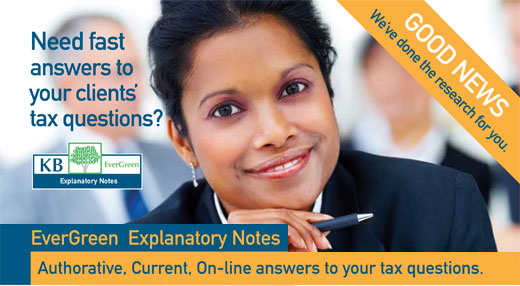Last updated: November 07 2017
The Paradise Papers, Pre-Budget Consultations and The Real Tax Gap

This week brought more controversial tax news to Canadians: the Paradise Papers and a new tax “consultation”; this time in advance of the 2018 Federal budget. The elephant in the room in both these stories is the unfinished “consultation” on the massive tax changes proposed for private businesses.
Small business owners are still reeling from the potentially exorbitant tax hikes on the incomes from their invested capital in private corporations within Canada, even as they hear about potential tax erosion from the Paradise Papers story. It appears that CRA is unable to tap into the “tax gap” left from the movement of assets offshore by prominent, wealthy Canadians, according to CBC reports.
Speaking from the Distinguished Advisor Conference being held in Kelowna, Evelyn Jacks, President of Knowledge Bureau, said, “There are many troubling aspects to this story starting with a key ingredient required for a fair taxation system: confidentiality. The burden of proof for accurate tax filings is always on the taxpayer, but in return the taxpayer has rights to the confidentiality of his or her taxation records, and impartiality. This is in fact enshrined in the sixteen Taxpayer’s Bill of Rights.”
This Taxpayer’s Bill of Rights is worth the read. For example, did you know:
“You have the right to receive entitlements and to pay no more and no less than what is required by law.” To make sure that all taxpayers pay only the correct amount of tax, the law must be simple and transparent and from a compliance point of view, it cannot be applied retroactively and punitively for people who don’t understand their rights.
For small business, the Taxpayer’s Bill of Rights says this: “CRA is committed to administering the tax system in a way that minimizes the costs of compliance for small businesses.” This makes a compelling case for dropping the onerous “reasonableness tests” and the mind-numbing complexity proposed for the tracking of sources of capital used for passive investments in private corporations.
In other words, there must be reciprocity in a self assessment system: if taxpayers must bear the burden of proof, there must be an equal obligation for the tax department to ensure all efforts are made to help Canadians mitigate their tax costs by communicating in a simple, understandable and effective manner what the law is, how people can comply with it and several appeal rights that allow people to get it right.
International tax law is very complex. It’s difficult for taxpayers and CRA alike to understand. While CRA needs to enforce the obligations people have when they move their assets offshore; these taxpayers also have taxpayer rights. Those who try to comply with the law are not tax cheats, if they took all steps to ensure they met their obligations to Canada are met.
These include the following requirements, which all taxpayers should take note of:
- If you are a resident in Canada at any time of the year you must file a tax return in Canada and report world income in Canadian dollars. This includes the income from offshore trusts and pensions. You must also declare on Form T1135, the cost of certain foreign assets over $100,000.
- Residents of Canada can be actual, factual or deemed. Certain deemed residents qualify for special tax credits in Canada. Therefore, you can still be tied to your tax obligations in Canada even if you or your money resides offshore.
- Canadian residents who hold foreign investment properties or who transfer or loan money to offshore trusts will be subject to Canadian taxation and complex annual reporting rules.
- Those who immigrate or emigrate are considered to be part-year residents of Canada, but may still have reporting obligations in Canada.
- Upon emigration from Canada, departure taxes must be paid on accrued gains on many assets held at that time. Professional help should be sought to understand which assets require reporting, how capital losses are identified and scheduled and what obligations may arise in both countries, if any, after departure. For example, those who are non-residents may still be required to file a tax return in Canada if they earn employment or self-employment income in Canada or sell taxable Canadian property.
- Taxes paid in other countries on the same world income reported in Canada will be the subject of a foreign tax credit to provide tax relief from double taxation. In other cases, tax treaties will provide relief.
 |
Most Canadians pay their taxes willingly and on time. It’s possible that the Paradise Papers story underscores just what happens when the fundamental principles of an effective tax regime – fairness, equity, simplicity and compliance - break down: people with means leave the country with their assets and their income, leaving burdensome tax obligations on lower income earners. That’s the real tax gap we have to fix.
Knowledge Bureau’s EverGreen Explanatory Notes and Cross Border Taxation course provide detailed information on the rules and implications of holding offshore assets. However, taxpayers who are in doubt about their compliance requirements when assets are held offshore should immediately seek advice from a qualified tax specialist and correct their situation before CRA comes knocking.
Evelyn Jacks is President of Knowledge Bureau, Canada’s leading educator in the tax and financial services, and author of 52 books on family tax preparation and planning.
©2017 Knowledge Bureau Inc. All Rights Reserved.





